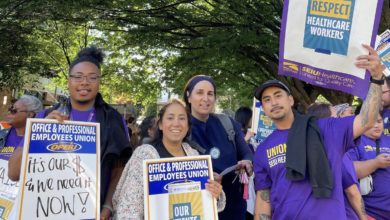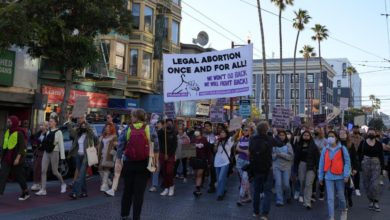People in Mississippi achieved a
victory on Nov. 8 when they defeated one of the most aggressive
anti-abortion measures seen on a ballot in years.
Initiative 26, commonly known as the “personhood amendment,”
sought to redefine the word “person” in the state constitution to
include “every human being from the moment of fertilization,
cloning or the functional equivalent thereof.”
Defining life as beginning at
“fertilization,” and not by the more common anti-abortion idiom
of “conception,” was more than just a choice of linguistic
styling. For anti-abortion advocates, conception is colloquially
thought of as the implantation of the fertilized egg into the uterine
wall, which occurs roughly two weeks after fertilization.
The key difference in the two definitions is the issue of
implantation, because over half of all fertilized eggs fail to
implant, and approximately two-thirds of all fertilized eggs
spontaneously abort within the first few weeks, often before a woman
even knows she is pregnant.
By defining life as the moment of egg
fertilization, the amendment not only sought to make abortion and
many of the most effective forms of birth control illegal, but
introduced some of the most insidious ramifications of any
anti-abortion bill in history. For example, ectopic pregnancies,
where a fertilized egg implants outside of the uterus into the
fallopian tubes, cervix, ovaries or abdomen, are never viable and
almost always fatal to the mother if not properly treated, and often
require surgical intervention.
Under this amendment, a doctor could
refuse to perform a surgical intervention in the case of ectoptic
pregnancy, even though the legally protected fertilized egg would
never develop and if not treated would eventually cause the death of
the mother.
Also problematic in the amendment was
its effect on in vitro fertilization, the most advanced medical
technology available for assisting with infertility. In IVF
treatments, eggs are fertilized in a lab and then transferred to the
woman’s uterus, where it is hoped they will implant and result in
pregnancy. Many individuals require multiple IVF attempts, and most
of the fertilized eggs die in the process. Additionally, there are
tens of thousands of fertilized eggs frozen in storage throughout
Mississippi, for use in future IVF attempts. Under the amendment,
fertility doctors and their patients could be held accountable for
murder for any of the fertilized eggs that are lost in the process.
The amendment included no exceptions in
the law to account for women or children impregnated by rape or
incest, nor did it
include exceptions for women stricken with life-threatening
illnesses. Cancer patients, for example, could have been denied
chemotherapy, because any treatment that could endanger the
fertilized egg would have held the patient and treatment provider in
criminal violation. Were this not extreme enough, the amendment could
have even opened the door to women facing investigation and criminal
prosecution in the event of miscarriage.
Also left out of the conversation by
those supporting the amendment is the issue of the deficit in social
support for women who would have been forced to remain pregnant and
their children had the amendment passed. Mississippi currently has
the highest percentage of people in the country dependent upon SNAP,
the Supplemental Nutrition Assistance Program, with nearly 21
percent relying upon the service for
their daily meals. Over 22 percent of people, or one in five
Mississippians, live below the federal poverty line,
14 percent
of children live in extreme poverty,
more than 18 percent of children have no health insurance, and the
state has the second worst rate of infant mortality
in the nation.
Although the defeat of this amendment
is an incredible victory for the people of Mississippi, the fight to
prevent such draconian laws from going into effect is nowhere near
over. Personhood USA, the group
behind the amendment, attempted unsuccessfully to get a similar
measure passed in Colorado in 2008 and 2010, and has announced that
they will introduce initiatives in Ohio, Florida, Montana, Oregon,
Nevada and California.
The Party for Socialism and Liberation
believes that a woman’s decision to have children should not be
restricted in any way. Birth control, abortion services and prenatal
care should be free and readily accessible, and families should have
abundant social support including free child care, free food, a home,
paid parental leave, excellent schools and free health care.
The defeat of the “personhood
amendment” is a victory not just for women in Mississippi but for
women around the country! We must continue to stand together to end
the attacks on women’s rights!






